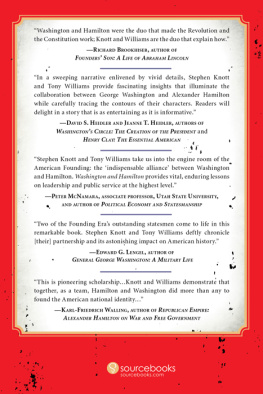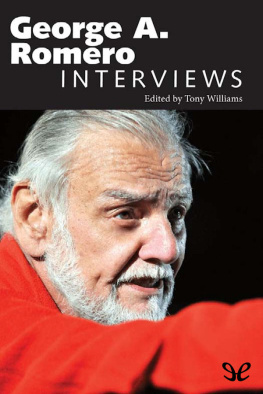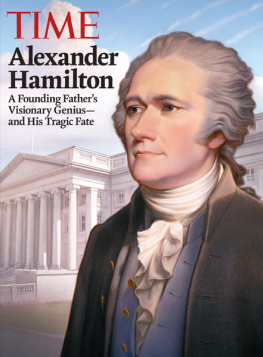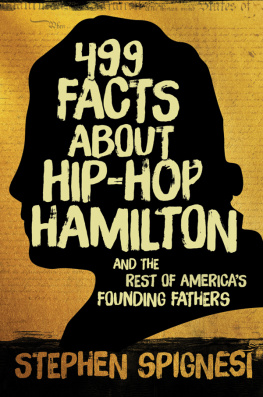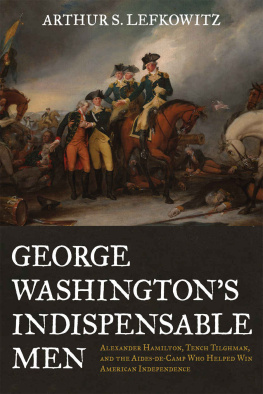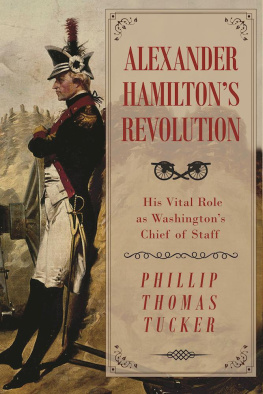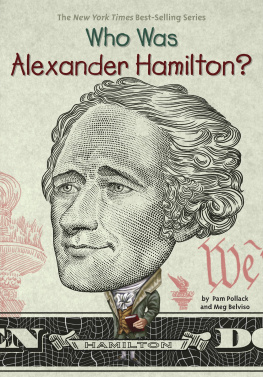Copyright 2015 by Stephen F. Knott and Tony Williams
Cover and internal design 2015 by Sourcebooks, Inc.
Cover designed by Jason Gabbert
Cover images Christies Images/Corbis, Alexander Hamilton by John Trumbull, National Portrait Gallery, Smithsonian Institution/Art Resource, NY
Sourcebooks and the colophon are registered trademarks of Sourcebooks, Inc.
All rights reserved. No part of this book may be reproduced in any form or by any electronic or mechanical means including information storage and retrieval systemsexcept in the case of brief quotations embodied in critical articles or reviewswithout permission in writing from its publisher, Sourcebooks, Inc.
This publication is designed to provide accurate and authoritative information in regard to the subject matter covered. It is sold with the understanding that the publisher is not engaged in rendering legal, accounting, or other professional service. If legal advice or other expert assistance is required, the services of a competent professional person should be sought. From a Declaration of Principles Jointly Adopted by a Committee of the American Bar Association and a Committee of Publishers and Associations
Published by Sourcebooks, Inc.
P.O. Box 4410, Naperville, Illinois 60567-4410
(630) 961-3900
Fax: (630) 961-2168
www.sourcebooks.com
Library of Congress Cataloging-in-Publication Data
Knott, Stephen F.
Washington and Hamilton : the alliance that forged America / Stephen F. Knott and Tony Williams.
pages cm
Includes bibliographical references and index.
(hard cover : alk. paper) 1. Washington, George, 17321799Friends and associates. 2. Hamilton, Alexander, 17571804Friends and associates. 3. United StatesPolitics and government17891809. 4. United StatesPolitics and government17831789. I. Williams, Tony, 1970 II. Title.
E312.17.K57 2015
973.410922dc23
2015008435
For J. David Gowdy,
patriot and friend
And for Brianna Doherty
Ask, and it shall be given you: seek, and you shall find
CONTENTS
INTRODUCTION
Americans have perennially been fascinated with our Founding Fathers. For example, the amicable relationship between Thomas Jefferson and James Madison, or the volatile relationship of Jefferson and John Adams, has captured the American imagination for almost two hundred years. Many excellent books about these partnerships have been written in addition to individual biographies of each and practically every Founding Father himself.
But one of the more important founding collaborations has been overlooked by readers: the unlikely partnership of George Washington and Alexander Hamilton. This extraordinary alliance between a wealthy Virginia planter and a brash immigrant from the Caribbean helped to win the Revolutionary War and establish a new order for the ages. These men fought together for the better part of twenty-five years to win independence and forge a new nation. Indeed, no other founding collaboration was as important to achieving victory and nationhood as Washington and Hamiltons.
Theirs was an unlikely alliance, for George Washington and Alexander Hamilton could not have been more different. Washington was a gentleman farmer from the patrician colony of Virginia and the owner of a great estate enriched by the labor of African slavery. As a rising member of the Virginia gentry, he satisfied the expectations of his station by entering into public service. Hamilton, on the other hand, was an illegitimate childthe bastard brat of a Scotch peddler, as John Adams brusquely put it onceand an immigrant from the West Indies. A self-made man, he made his way to America on his own and earned his positions in the army and the government. Despite their differences, Washington and Hamilton shared a lot of common ground. They collaboratively pursued their vision of a continental republic throughout the Revolutionary War and through the founding of the nation. They both embraced the revolutionary ideals of the era, though with Hamilton usually playing a subordinate role to Washington, who was seen as essential to the successful creation of America.
If George Washington was the indispensable man of the American founding, then Washington and Hamiltons collaboration was the indispensable alliance that determined the outcome of the fight for (and founding of) the United States. This is not to diminish the other important relationships that reveal much about the American founding: John Adams and Thomas Jefferson crafted the Declaration of Independence, suffered a partisan rupture, and wrote a famous exchange of letters discussing the nature of the Revolution. Hamilton and Jefferson feuded heatedly for years over how best to preserve republican principles and offered contrasting visions of American institutions. Fellow Virginians James Madison and Jefferson struggled for liberty in Virginia and then bolstered each other as they fought what they perceived to be dark forces that threatened the republican principles of the new nation.
What makes Washington and Hamilton unique from these other founding collaborations was that their bond was forged in the crucible of the Revolutionary War. Unlike their great contemporaries, Washington and Hamilton saw war up close and personal; they were brothers in arms in a sense, and as any combat veteran will attest, battle is a bonding experience like no other. Their mutual experiences helped them form the core cadre of leadership in the struggle for independence from Great Britain and win the war against overwhelming odds. They drove the nationalist forces that would culminate in a more perfect union formed at the Constitutional Convention and ratified in 1788. They breathed life into the institutions of the early republic while setting important precedents as president and secretary of the treasury. Thus, their joint efforts can be seen as the indispensable alliance of the founding. Their story has all the elements of a Shakespearean dramawar, the quest for fame, scandal, the birth of a new nation. Additionally, Washington and Hamiltons story bolsters the somewhat unfashionable notion that the actions of great individuals can influence the course of history.
The months in which they first met remain shrouded in mystery, and little of what they wrote, especially in the early years of their relationship, reveals anything beyond a professional collaboration. How then can we describe their relationship? The word friendship does not seem to apply. Indeed, one wonders whether Washington can accurately be described as having any friends. He was purposefully distant and aloof as he jealously guarded his reputation, rarely letting his guard down, even with those who were considered intimates. He constantly warned others about the dangers of familiarity and scrupulously kept his relations formal. Hamilton, for his part, had some very close friends, such as John Laurens, and often gushed with emotions characteristic of eighteenth-century romanticism. But he never expressed himself in that way with Washington.
Washington and Hamilton may not have been best friends for the entire time they knew each other, but they shared a strong and lasting admiration, trust, and even affection for each other that had a significant impact upon the country. Some have described the childless Washington as playing the role of a surrogate father to the illegitimate Hamilton. Richard Brookhiser, in his excellent study of George Washington and fatherhood, notes the group of surrogate children was his staff during the Revolutionary War, which he called his family. This view probably comes closest to the mark, since Hamilton and the other staff members deferred to their father with respect and admiration for his virtue, though at times engaging in youthful rebellion. Many interpretations related to Washingtons surrogate fatherhood for Hamilton border on the Freudian and offer little insight; for instance, Pulitzer Prizewinning author Ron Chernow argued that Hamilton had suppressed Oedipal rage toward Washington. Hamilton may have been driven incessantly by the desire for honor and glory, and this may have impeded his relationship with Washington, but Hamilton (unlike John Adams and others) was not competitive with Washington.

